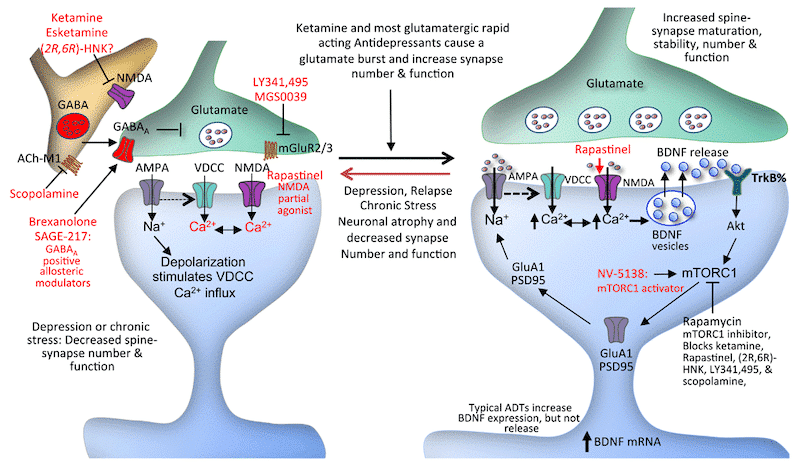
The Secret of Discussing Ketamine with a Depressed Person
Although it sounds easy enough, discussing ketamine with a depressed person can be tricky because you want to avoid making the person feel worse. As a family member or friend, there are different ways that you can approach helping someone you care about and encouraging them to get help.
More than 300 million people experience depression globally. While this is an ongoing challenge for the sufferer, often their family and friends are made to feel no better – feelings of helplessness, fear, anger, sadness and guilt are common. While these feelings are not unusual, the best way to help is to find a practical approach to help the afflicted person overcome their situation. Thankfully, you can take several actions that can have a real, lasting benefit.
The Secret of Suggesting Ketamine Therapy for Someone with Depression
Before suggesting ketamine to someone with depression, you need to understand:
- Depression as a medical condition
- How ketamine therapy works.
Having this level of understanding will make it easier to convince the person.
Ketamine for Depression: How it Works
What differentiates ketamine from other antidepressants is in the mechanism by which it works in a user’s brain. While traditional antidepressants typically focus on altering levels of serotonin and dopamine in the brain, ketamine is theorized to assist in repairing neuron synapses via the neurotransmitter glutamate. Ketamine is far better than the alternatives in the speed with which it takes effect. Normally, an antidepressant takes over a month to show any signs of working, and then takes the same or longer to get off of it before the next month process can begin; Ketamine, on the other hand, shows results within the first 24 hours after the infusion.
Ketamine works by 2 major pathways:

- Glycogen synthase kinase-3 (GSK-3) pathway: Results in the rapid antidepressant and anti-suicidal benefit of ketamine.
- Ketamine activates the production of brain-derived neurotrophic factor (BDNF): Ketamine increase BDNF and the number of receptors to which BDNF binds and over time, there is more repair factor and more receptors available to be activated by the repair factor. The outcome is that over a period of weeks, neuroplasticity and repair occur in the brain, leading to reduction in depression as it is the result of the breakdown in circuits and damage to the brain.
Common Ways to Help a Person Through Depression
Provide Companionship and Support
Companionship and support are just about the most important things a depressed person needs from their loved ones. Giving them a listening ear and a shoulder to cry on can play a major role in their recovery. You will need to be patient with them and always let them know you are there for them.
Give Them Positive Reinforcement
Those suffering from depression often judge themselves to be lazy, worthless, and weak. You can help them overcome these feelings by constantly reminding them of how strong, loved, and important they are.
Offer Assistance
A depressed person may suddenly find it difficult to handle even basic daily tasks. Your offer to help with even menial tasks may be more impactful then you realize.
Encourage Them to Follow the Treatment
Ultimately, depression is difficult to overcome without treatment from a medical professional. If already receiving treatment for depression, you can help the patient remember to take their medications and keep appointments.
Help Create Low-Stress Activities for Them
Having a regular routine can be instrumental in managing depression symptoms. As a relative or friend, you can help them create these low-stress routines. For example, a daily schedule can include a few minutes for stretching exercises, household chores, getting the kids ready for school, preparing meals and going to sleep at the right time.
Locate Support Groups
Being in the company of other people with similar experiences can help the patient cope with depression. You can help locate counseling and support organizations in your community, and offer to get more information, help them sign up, and ensure they attend meetings.
Suggest Effective Treatments
If the patient hasn’t started treatment yet, or it appears that the one they are undergoing isn’t working well, you can suggest other solutions to them. If conventional treatments are not effective, a depressed person may explore spiritual or alternative medicines, including ketamine, a psychedelic compound that has been approved for use in the treatment of depression in the U.S by the Food and Drug Administration (FDA).
Ketamine Treatment for Depression
In March 2019, the FDA approved a new ketamine therapy for treatment-resistant depression. The approval came after several studies showed that small doses of ketamine can rapidly treat depression. Unlike many other antidepressants, ketamine’s effects are noticeable within a few hours of treatment, and it is singularly effective in its ability to tackle treatment-resistant depression. For patients experiencing prolonged depression, impervious to other treatments, ketamine-assisted therapy may be the answer.
Involve a Medical Professional
If your friend or relative is still skeptical after you talk to them, you may involve a medical practitioner. There are many doctors with a great knowledge of ketamine’s effects on depression. These doctors can also help recommend a reputable clinic for the person’s ketamine therapy.
Why Ketamine?
Ketamine was initially used as anesthesia during surgeries but was later discovered to have antidepressant properties. While there are other antidepressant pharmaceutical treatments available, ketamine is becoming favoured, for the following reasons:
It Has FDA Approval
Safety, tolerance, and efficacy are the most important qualities to look for before choosing a therapy. Ketamine received FDA approval because it possesses all these qualities.
Rapid and Sustainable Antidepressant Effects
Conventional antidepressants have a delayed onset; it may be weeks or months of daily use before they begin to show clinical effects. In contrast, ketamine’s effect is rapid, showing noticeable benefits within hours. Ketamine works on the brain differently, targeting glutamate receptors, instead of the monoaminergic system as is the case with more traditional anti-depressants. Research also shows that ketamine is a particularly effective therapy for patients whose depression is impervious to treatment.
Has Healing Properties for Chronic Pain
There is a strong link between depression and pain. If the patient is experiencing depression and physical pain, ketamine may be able to address both conditions simultaneously. A low dose of ketamine is already commonly used to relieve pain in post-surgery and burn treatments, as it also helps reduce the dose of addictive painkillers, like morphine.
Can Help Treat OCD
While depression and obsessive-compulsive disorder are not technically related, they share common signs and symptoms and often co-occur, so any treatment that can affect both disorders would be highly desirable. A single dose of ketamine given over 40 minutes led to a significant decrease in obsessive-compulsive behaviour, according to a 2013 study. Researchers also found that the benefits were both rapid and long-lived.
Has High Success Rate
Ketamine infusion therapy has between a 50% and 70% success rate in reducing or eliminating severe depression symptoms, according to the Texas Medical Center, a rate significantly higher than conventional antidepressants, with an average success rate of 40% to 45%. Ketamine’s advantage is in its restoration of nerve cell functions, says Dr Asim Shah of the Baylor College of Medicine. Shah likened ketamine effects on nerve cells to how ‘Miracle Gro®’ can impact a lawn whose soil has been exhausted.
Side Effects
As with many anti-depressant therapies, ketamine does come with side effects, which may include a rise in blood pressure, dizziness, and feelings of disconnection from reality. And of course, its broader application in psychotherapy is still quite new, so more research is still needed to ensure that its long-term effects are fully understood.
Have Your Ketamine Treatment in a Medical Clinic with a Professional
Ketamine has long been available through the black market, and as such, depression sufferers have sought to buy the drug on the street or from online stores and self-administer. Their rationale is clear – this is a cheaper way to obtain the drug then receiving treatment in a clinic. While self-administration may save some money, it can create significant complications. Ketamine is something of a miracle in the right hands, but away from a clinic, it can cause tragedies, says the president of the American Society of Anesthesiologists, John Abenstein. The following are reasons why you should pay more to have your ketamine therapy in a medical clinic, as opposed to buying the product illegally and self-administering it.
Avoiding Drug Abuse
Despite its approved status, ketamine remains a controlled substance as a Schedule III drug, a classification reserved for drugs that can cause physical dependence or high psychological dependence if abused (which is much more likely to happen if the drug is self-administered). A study showed that such abuse can cause cognitive defects, with decreasing performance on working memory and pattern recognition.
Your ketamine provider will not just sell you the drug. They will have a thorough examination of your medical history before proposing the most suitable treatment cause for your case. Further, they will help to uphold state and federal laws around the drug’s registration, inventory management and prescription protocols. The same cannot be said of buying the drug online, where there is always a possibility of receiving a product at a lower dose or ‘cut’ with another chemical.
Ideal Conditions
Like any therapy, ketamine has its ideal conditions for application, including patient preparation, dose, administration method, after-treatment care, etc. These factors can only be assessed following a comprehensive pre-treatment examination. The examination will reveal if you are even a candidate for ketamine infusions or would actually benefit from more traditional treatments. The consultation will involve a history of your medical history and pre-procedure lab tests (e.g. liver test). After that, the clinic will establish the course of treatment, and will tell you what to do in preparation for the treatment (such as what and when to eat before the treatment).
Ketamine therapy is performed as an outpatient procedure by a certified medical team, which typically consists of an anesthesiologist and a nurse or other trained medical professional. Ketamine treatment has been shown to be most effective when paired alongside psychotherapy and would thus also have a psychiatrist or psychologist present.
Availability of the Right Equipment
Ketamine therapy should be administered in a comfortable infusion room, using the right equipment, such as a comfortable recliner and monitoring equipment for oxygenation, EKG, and blood pressure, which will be applied to the upper arm, upper chest, and finger respectively. And then a small IV will be applied in your hand or forearm. Emergency equipment, such as a breathing apparatus, will also be on hand. The patient will be closely monitored throughout the procedure to ensure they are having a pleasant experience and talk them through any periods of concern.
Ensure Legality
At the moment, the only way to ensure that the patient is on the right side of the law is when the drug is administered in a licensed medical clinic. While ketamine has been approved by the FDA, its recreational use remains illegal, and self-administration would be subject to significant fines, and possibly jail time.
Related Articles
- Check out Frshminds’ Guide to Ketamine Clinics to learn about ketamine in order to select a clinic that meets your needs.
- 5 Things You Should Know Before Starting Ketamine Infusions for Bipolar Depression
- The Secret to Getting Health Insurance to Cover Ketamine Therapy
- Your First Ketamine Therapy Session: What to Expect
- Ketamine as a Rapid Onset Antidepressant
- A Ketamine Clinic Near Me: Roots Behavioral Health
- A Ketamine Clinic Near Me: The Infusion Clinic of Ocala
- A Ketamine Clinic Near Me: Dr Ken Starr in Arroyo Grande
- Ketamine Assisted Psychotherapy (KAP): Demographics, Data and Outcomes
- Meet ‘Sarah’, She Uses Ketamine Infusion Therapy for Depression
- Talking with a Ketamine Infusion Doctor: Dr. Franklin
References
https://www.nhs.uk/news/mental-health/ketamine-tested-as-severe-depression-treatment/
https://onlinelibrary.wiley.com/doi/abs/10.1111/j.1360-0443.2009.02761.x
https://onlinelibrary.wiley.com/doi/full/10.1002/brb3.1423
https://clinicaltrials.gov/ct2/show/NCT00088699
https://www.ncbi.nlm.nih.gov/pmc/articles/PMC6322816/
https://onlinelibrary.wiley.com/doi/abs/10.1002/da.22975
https://www.mayoclinic.org/diseases-conditions/depression/in-depth/depression/art-20045943

Comments